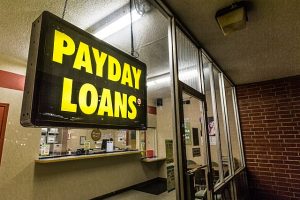Payday lending is not the big bad wolf that it is made out to be says one study
By: Phoenix Lee/
“Despite their high cost, payday loans appear to increase the welfare of consumers by enabling them to survive unexpected expenses or interruptions in income,” said a a Clemson University study which revealed that they are not a contributor to bankruptcy.
The study on payday lending showed that by a key measure of financial outcomes, payday loans are not harmful to their users.
Table of Contents
The 2008 study on payday lending said:
“Dr. Petru S. Stoianovici and Prof. Michael T. Maloney studied the relationship between payday lending and bankruptcy filings over the period from 1990 to 2006. Using state-level data on the legality of payday lending and on the number of loan stores, the investigators found that neither the legality of payday lending nor an increase in the number of loan stores led to higher rates of consumer bankruptcies.
According to Dr. Stoianovici, he and Prof. Maloney studied the effects of payday-lending legislation and of the numbers of payday-loan stores in early years on personal bankruptcy filing rates in subsequent years. Their study used two different analytical techniques, neither of which found any relationship between payday lending and bankruptcy rates. One of the techniques, called Granger causality testing, is specifically designed to test whether one phenomenon can be said to cause another occurring in a later period.
The findings of the study are consistent with those of other investigators — including Dr. Donald P. Morgan of the Federal Reserve Bank of New York and Prof. Jonathan Zinman of Dartmouth College — that access to high-interest-rate consumer credit correlates with improved household financial condition.
An earlier study by Profs. Paige Skiba and Jeremy Tobacman found evidence that making a first payday loan application is related to increased filing rates for a particular kind of bankruptcy called chapter 13, but only for certain marginal loan applicants. The results of the present Clemson study contradict those findings. Importantly, Profs. Skiba and Tobacman found no causal relationship between access to payday loans and bankruptcy filing rates for all payday loan borrowers as a whole.
Chapter 13 is a form of personal bankruptcy that was used, in the period studied by Profs. Skiba and Tobacman, primarily by wealthier debtors to preserve their equity in a personal residence. Chapter 13 filings constitute about one-fourth of all bankruptcy filings. To the limited extent that payday-loan borrowers do file for bankruptcy — about 2% of all borrowers — they generally do not file under chapter 13, Prof. Maloney observed.
Commenting on the study, Prof. Maloney said, “This study has important policy implications for legislators considering restrictions on consumer credit, including the interest-rate limitations put forth by President Obama in his economic stimulus proposal. Despite their high cost, payday loans appear to increase the welfare of consumers by enabling them to survive unexpected expenses or interruptions in income. The study shows that, by a key measure of financial outcomes, payday loans are not harmful to their users.””
 Payday lending is the practice of loaning a small, short-term unsecured loan. It is called payday loan regardless of whether repayment of loans is linked to a borrower’s payday. The loans are also sometimes referred to as “cash advances,” though that term can also refer to cash provided against a prearranged line of credit such as a credit card. Payday advance loans rely on the consumer having previous payroll and employment records.
Payday lending is the practice of loaning a small, short-term unsecured loan. It is called payday loan regardless of whether repayment of loans is linked to a borrower’s payday. The loans are also sometimes referred to as “cash advances,” though that term can also refer to cash provided against a prearranged line of credit such as a credit card. Payday advance loans rely on the consumer having previous payroll and employment records.
Although some have noted that payday lending appears to carry substantial risk to the lender, others (like the Clemson University study) have shown that these loans carry no more long term risk for the lender than other forms of credit.
You may need a personal loan for a number of reasons — perhaps to deal with unexpected medical expenses, to consolidate high-interest credit card debt, to expand your business, or even to take that well-deserved vacation. Unfortunately, if you have borderline or bad credit, personal loans may be difficult to get at most banks.
Nobody wants to pay a higher interest rate than he or she has to, so consider the purpose of your loan before applying. Is it for debts or upcoming expenses that require immediate attention, or can the loan wait until you have an opportunity to build up your credit score and receive a better rate?
How to Secure Personal Loans Quickly
If you are in a financial crunch and are searching if personal loans useful to expand your business, the loan consultants at iCompareLoan can set you up on a path that can get you a it in a quick and seamless manner. Our loan consultants have close links with the best lenders in town and can help you compare various loans and settle for a package that best suits your needs. Find out money saving tips here.
Our Affordability Tools help you make better property buying decisions. iCompareLoan Calculators help you ascertain the fair value of a property and find properties below market value in Singapore.
If you are looking for a new home loan or to refinance, our Mortgage brokers can help you get everything right from calculating mortgage repayment, comparing interest rates all through to securing the best home loans in Singapore. And the good thing is that all our services are free of charge. So it’s all worth it to secure a loan through us for your business expansion needs.
Contact us for advice on a new home loan.
Contact us for home loan or refinancing advice.






